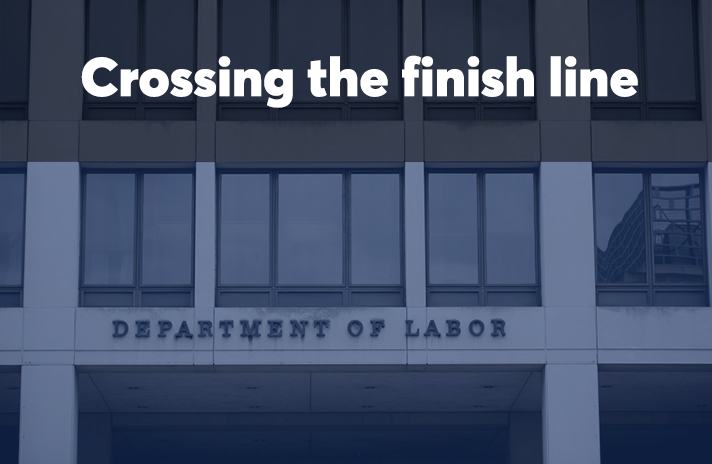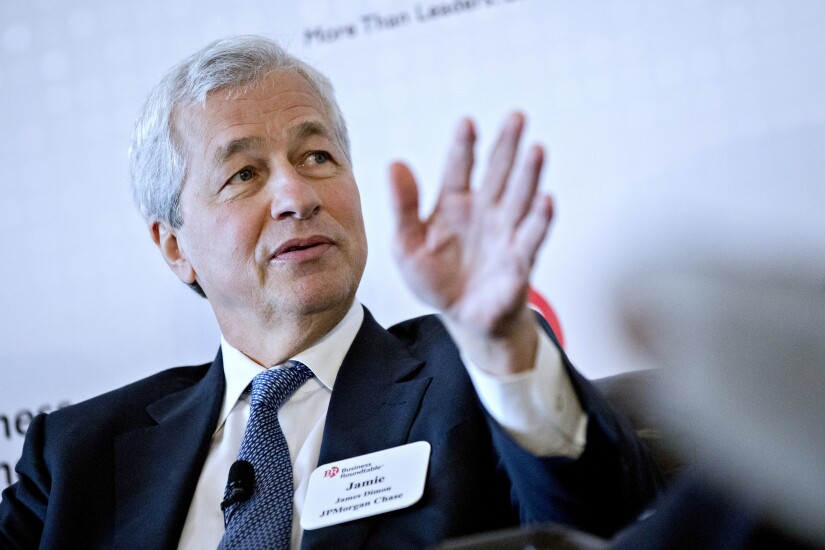
While the Department of Labor’s regulation has roiled the entire industry, firms including Merrill Lynch, JPMorgan Chase and Ameriprise have made some of the most far-reaching and costly changes.
Financial Planning analyzed 13 top firms’ compliance plans and public statements about the rule. Certain elements are
All firms that submitted a comment to the agency called for delaying the rule, if not for outright repeal. Many top executives publicly supported the spirit of the regulation. Yet, few, if any, said they backed the initial April deadline or the subsequent June date (a few called for additional delays).
Privately, though, firms spent tens of millions of dollars altering their commissions and fees and preparing to qualify for the rule’s best interest contract exemption.
President Trump’s administration may well push back the full implementation date or even repeal the rule. Despite the uncertainty, wirehouses, broker-dealers and banks alike pronounced themselves ready to deal with any outcome that may take shape in coming months.
To learn more about each firm’s compliance plans and public statements about the rule, click through our slideshow.

Merrill Lynch
“We have analyzed the limited situations where recommending a fee-based arrangement might not be in a client's best interest and have considered alternatives [to the firm's Investment Advisory Program] for these situations,” Merrill head Andy Sieg said in a memo to employees sent in May.
The New York-based firm and Commonwealth Financial Network vowed to end commission-based retirement plans in the fall, with the IBD following Merrill’s lead. Nearly every other firm indicated they would employ the rule’s exemptions to keep offering such plans.
To read more, click

Ameriprise
Preparations for changes such as phasing out 12b-1 fees in advisory accounts cost the firm $11 million in the fourth quarter alone, CEO Jim Cracchiolo said
"Clearly, the situation is evolving with the new administration," Cracchiolo said. "We are remaining flexible. If the rule is delayed then we will adjust accordingly. However, we are making some changes that we believe will situate us with where the industry is going."
The Minneapolis-based firm also filed a comment with the Labor Department
Ameriprise later submitted
To read more, click

U.S. Bank
Costs linked to the fiduciary rule helped boost the firm’s noninterest expenses by 6.9% in the fourth quarter of 2016,
"We're investing heavily into it," U.S. Bank Chairman Richard Davis said.
To read more, click

LPL
The nation’s largest IBD
“We expect the rule to create disruption that will lead to movement of both advisers and assets in the coming months and years,” CEO Dan Arnold said during the company’s first quarter earnings call.
Arnold said LPL is “on track” to make all adjustments required under the fiduciary rule.
LPL has slashed fees in its Model Wealth Portfolios and created a new menu tool allowing advisers to choose among mutual fund families,
The political wrangling around the fate of the rule will not affect the company’s plans, according to Arnold.
“We will continue to move forward with many of our previously announced activities and policy changes that we believe are beneficial for advisors and their clients, regardless of the ultimate outcome of the DoL fiduciary rule,” Arnold said in the firm’s annual report.
To read more, click

Morgan Stanley
The rule has “probably” harmed Morgan Stanley’s recruiting, CFO Jonathan Pruzan told analysts in the firm’s earnings call for the first quarter. Morgan Stanley, along with other wirehouses, have cut the size of transition deals in response to regulatory guidance from the Labor Department. They've also pledged to reduce overall recruiting efforts.
Meanwhile, Morgan Stanley wealth management co-heads Shelley O’Connor and Andy Saperstein notified employees in January that the firm
The shifts included cuts to commissions for stock and ETF trades, curbs on conflicts of interest with third-party managers and more disclosures to clients.
“With or without the rule, we fundamentally believe that serving our clients well and continuing to lead the industry forward require that we provide an increasingly higher standard of care for our clients,” O’Connor and Saperstein said in the memo to employees.
To read more, click

Stifel
In addition, the St. Louis-based firm last year
"I think the DoL rule has a disproportionate impact on the independent business, and that affected our decision-making,"
Separately, Kruszewski also called on the Labor Department to delay implementation beyond the June deadline. The rule is “not consistent with the administration’s stated priorities” and must be pushed back an extra six months, he argued in an April
“In our own experience, we will be forced to turn away tens of thousands of accounts belonging to small investors,” Kruszewski wrote. “Likewise, we will be forced to reduce our product and service offerings under the rule.”
To read more, click

JPMorgan Chase
The New York-based bank
“Your financial adviser can continue to provide you with investment guidance and assist with any service requests you may have on this account,” the firm told clients in an April message.
To read more, click

Wells Fargo
David Carroll, the San Francisco-based bank's head of wealth and investment management, cited the criteria for the further study of the rule
“We do not believe the rule will achieve the Presidential memorandum’s stated priority of facilitating Americans’ ‘ability to save for retirement and build the individual wealth necessary to afford typical lifetime expenses,’” Carroll
Wells Fargo sees the rule as “overly broad,” the BIC exemption as “impracticable” and the full implementation deadline of Jan. 1, 2018, as “impossible,” according to the firm’s letter.
The debate around the rule has presented challenges to all firms, Brand Meyer, the 46-year industry veteran tasked with supervising Wells Fargo Advisors’ compliance with the rule, said in a panel at SIFMA’s Private Client Conference.
“In my long career I have never seen anything play out quite like this. It's zigged and zagged," Meyer said.
To read more, click

Advisor Group
The company, which is the parent of four independent broker-dealers with more than 5,000 advisers, spent “untold numbers of hours and dollars” preparing for the rule,
"Regardless of whether the rule goes into effect, we will be operating in the fiduciary era," she says.
Advisor Group weighed in on the Labor Department's then-proposed 60-day delay in March, with executives saying the firm “strongly supports” the delay but prefers a longer one. The firm was purposely waiting to inform clients of the impact of the rule on their accounts, according to
To read more, click

UBS
"Different firms are making different decisions," says UBS Wealth Management Americas President Tom Naratil. "We've made the choice that we feel is the most client centric and adviser focused."
Executives with the Zurich, Switzerland-based firm submitted two letters to the DoL expressing support for delaying in the rule. The SEC rather than the DoL should lead the creation of any fiduciary standard, according to UBS’
“A comprehensive retirement discussion needs to address both accounts covered by the rule and accounts that are not,” the letter said. The rule has an “expansive definition of who is considered a fiduciary” and “narrow and unduly burdensome exemptions,” according to UBS.
To read more, click

Raymond James
“We are evaluating the impact of the DoL rule on our business,” the report said. The exemptions for Raymond James’ qualifying accounts, particularly its IRAs, will lead to “increased legal, compliance and information technology costs,” according to the report.
The firm is also working to negotiate new commissions and fee structures with its mutual fund partners, according to a recent presentation for analysts. The firm already reduced both fees and commissions in its annuity and UIT products.
“Changes to adviser payouts, client pricing, and support from product providers will be required to offset a portion of the increased costs associated with complying with the DoL fiduciary rule," according to the
To read more, click

Ladenburg Thalmann
The firm disclosed in
“The DoL rule could be further delayed or revised,” the report said. “However, until there is some definitive action impacting the DoL Rule, we intend to continue to pursue necessary changes.”
To read more, click

Cetera Financial Group
“Over the past several months, we have taken a number of steps to develop new advice and compensation models that we believe will more fully align our interests with those of our customers,” Antoniades wrote.
“That being said, we believe that parts of the regulation could be better designed to protect the interests of retirement savers while assuring them the greatest amount of flexibility in gaining access to professional advice in ways that best serve their interests.”
Meanwhile, Cetera Financial Group CEO Robert Moore has revealed some literal client-facing changes: facial recognition software. The tool,
“We know a large percentage of communication is non-verbal,” Moore says. “Advisers will have a tool that helps hone in on that, and will help utilize that in informing all kinds of follow-up conversations, dialogue we can use in the best interest of those clients.”
To read more, click





